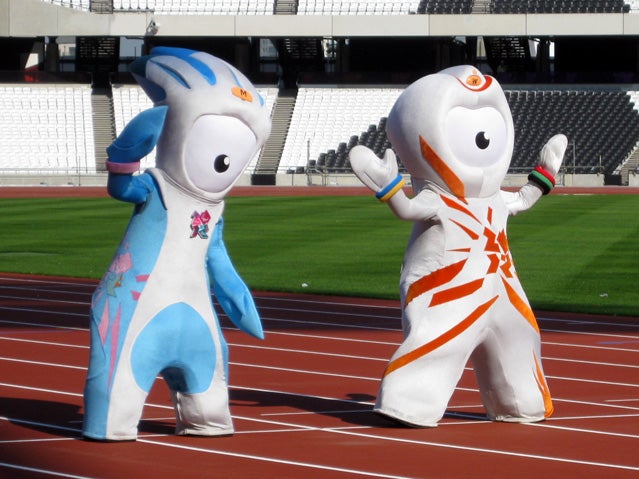Everybody has been tuning in to watch the London Olympics. The ratings are up鈥攚ay up鈥攐ur president is tweeting his congratulations to Michael Phelps, and Romney even paid the Games a visit. It鈥檚 essentially like the Super Bowl, except drawn out over several weeks and actually paid attention to worldwide.
As always, we鈥檝e been surprised, amazed, and disappointed (mostly by NBC). We鈥檝e seen media-constructed pre-race rivalries collapse as would-be stars fail to perform. And we鈥檝e heard our fair share of pseudo-intellectual commentary from the .
What makes these Games a bit different is Twitter (and all of the women). Not only did social media prevent telecasters from broadcasting the time gaps and positions in the men鈥檚 road race, but NBC鈥檚 insistence on tape-delaying all competitions and then acting like they鈥檙e live has led to an Internet firestorm.
More worthy of note: These Games mark the first time in history that all participating countries have fielded women. That鈥檚 great. But one wonders if things could have been handled a bit better. It seems surprising, to say the least, that a judoka whose participation in the Games was contingent on her wearing a headscarf would be told by the International Judo Federation that she would have to compete without a headscarf once she鈥檚 in London. While things did work out in the end, it seems like these issues could have been handled ahead of time.
If you thought inequality in sports (and life) was something only women in countries like Saudi Arabia have to deal with, it鈥檚 worth noting the comments of silver medal-winning cyclist Lizzie Armistead. She and it鈥檚 governing body, the U.C.I., for being sexist. And by many accounts, she鈥檚 right.
For one, while Armistead competes on the road, it鈥檚 interesting to note that track cyclists who are women must than their male counterparts鈥攕omething that isn鈥檛 the case in most other sports, such as swimming or running.
If nothing else, the Games have provided a healthy dose of (non-Caucasian female swimmer goes faster than American in 1/8th of race, ) and nationalism. What more could any viewer ask for? 聽
Can one teenager remake the image of women’s boxing?
“For a while, he was training one of his sons to be a boxer. ‘He was real good, too,’ he said. ‘But he quit to play basketball. I said, ‘You watch! I鈥檓 going to have somebody!” Crutchfield grinned. ‘I always knew I鈥檇 have a champion,’ he said. ‘I just never thought it鈥檇 be a girl.'”
Mississippi is not the healthiest state in the union. In fact, it’s one of the least healthy鈥攚hich is why Iran might just prove a model for improvement.
“His methods are scrappy and scattershot, but Shirley is used to working around the system. After 60 years, perhaps the main reason he鈥檚 turning to an Iranian model is because, unlike everything else in Mississippi, it worked. In one year, HealthConnect cut the rate of readmissions to the Central Mississippi Medical Center by 15 percent.”
We don’t hear much about it, but rabies remains a medical mystery. And a fascinating one.
“Try to conjure up an image of the rogue genius doctor, the man who saves a doomed patient by bucking the medical orthodoxy, and your mental picture is unlikely to look like Rodney Willoughby. Fifty-six and stocky, with small oval spectacles that he pushes atop his graying hair while lost in thought or conversation, Willoughby is the opposite of a hothead physician: unhurried in his manner, thoughtful and earnest in his speech. A specialist in pediatric infectious disease at the Children鈥檚 Hospital of Wisconsin, he was dubious when, in October 2004, he heard that a possible case of rabies was being transferred to his care.”
We seem to hear about swimming only over the Olympics. But for some people, it’s an every-day love.
“Were I to lose my legs, I鈥檇 ask the lifeguard to wheel me to the side of the pool and dump me in. I鈥檝e even tried to see how far I can swim with my eyes closed, in the event that I suddenly lose my eyesight鈥攊f I count my strokes correctly, I can make the flip turn without missing the wall. What is it about the water that keeps us coming back? What so entices us that we鈥檒l offer up our shoulders and knees, not to mention sleep, a cup of coffee while we read the news, morning sex with our spouses?”
The Olympics can be about much more than competition; they can highlight social conflict. As women are now represented by all competing countries, the moment when two track stars raised their fists is only more noteworthy.
“After winning a respective gold and bronze medal in the 200-meter dash at the 1968 games in Mexico City, two American track stars鈥擳ommie Smith and John Carlos鈥攕hocked the world when they bowed their heads and raised their black-gloved fists in the air while they stood on the victor’s podium. As the national anthem played, the runners’ symbolic gesture was a protest of the social inequality endured by blacks in America and an expression of solidarity with the world’s oppressed peoples.”


